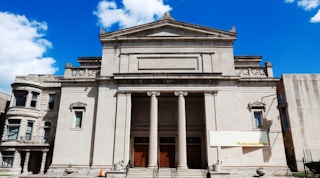
Cookies in use
Stances of Faiths on LGBTQ+ Issues: African Methodist Episcopal Church

Since 2003, leaders of the 2.5 million-member African Methodist Episcopal Church have made several public statements declaring the denomination’s opposition to the ordination of openly gay clergy members and marriage rights for same-sex couples. It has, to date, remained silent on transgender members.
BACKGROUND
The African Methodist Episcopal (AME) Church is a predominantly African American Methodist denomination based in the United States. The AME Church originated as a protest against the racial discrimination experienced by people of African descent at white Methodist congregations, such as the St. George Methodist Episcopal Church in Philadelphia. In 1787, Rev. Richard Allen and Rev. Absalom Jones withdrew from St. George Methodist Episcopal Church and founded The Free African Society, marking the beginnings of the African Methodist Episcopal Church.
It was formally organized in 1816 by a group of several black congregations in the mid-Atlantic area and they consecrated Richard Allen as the first Bishop of the African Methodist Episcopal Church. The denomination continues to be a member of the family of Methodist Churches.
The AME Church operates under an episcopal form of government. Bishops constitute the chief executive and administrative officers of the church, and their authority is derived from the General Conference.
LGBTQ+ EQUALITY
ON SEXUAL ORIENTATION & GENDER IDENTITY
The African Methodist Episcopal Church has traditionally established no formal policy on issues that affect LGBTQ+ people. But it has long been clear that the church condemns same-sex relationships. And in 2004, church leaders articulated that condemnation in a rare statement against marriage equality that same-sex relationships contradict their understanding of Scripture.
The AME Church does not appear to address transgender issues specifically but does closely follow scriptural teachings regarding God’s creation of man and woman with the implication that gender is biologically determined.
ON MARRIAGE EQUALITY
At the AME national convention in July 2004, delegates voted to forbid ministers from performing marriage or civil union ceremonies for same-sex couples. The vote was unanimous, and there was no debate on the topic. The decision marked the first vote on the issue of marriage rights for same-sex couples by a predominantly African-American denomination.
Earlier in the year, before marriage became legal for same-sex couples in Massachusetts, the Rev. Gregory G. Groover Sr., an AME pastor in Boston, explained why AME preachers opposed the move. He was quoted in the Boston Globe on Feb. 10, 2004, as saying: “As black preachers, we are progressive in our social consciousness, and in our political ideology as an oppressed people we will often be against the status quo, but our first call is to hear the voice of God in our Scriptures, and where an issue clearly contradicts our understanding of Scripture, we have to apply that understanding.”
ON NON-DISCRIMINATION
The AME Church does not appear to have taken an official stand on the Equality Act or other issues regarding non-discrimination protections for LGBTQ+ people.
ON ORDINATION
In August 2003, after an article in USA Today incorrectly stated that the African Methodist Episcopal Church ordained gay ministers, Bishop Richard Franklin Norris issued this statement refuting that position and instructed all AME pastors to read it to their congregations: “The official position of the African Methodist Episcopal Church is not in favor of the ordination of openly gay persons to the ranks of clergy in our church. This position reaffirms our published position papers, public statements and prior rulings, all of which indicate that we do not support the ordination of openly gay persons.”
RESOURCES
Many Voices is Black church movement for LGBTQ+ justice working toward a community that embraces the diversity of the human family and ensures that all are treated with love, compassion, and justice.
CONTACT INFO
African Methodist Episcopal Church
500 8th Avenue South
Nashville, TN 37203
- Topics:
- Religion & Faith
Love conquers hate.
Image:
